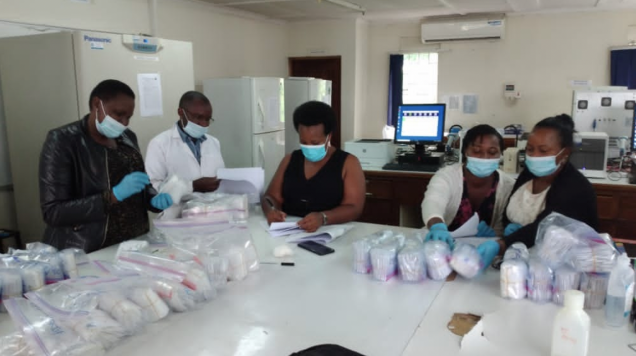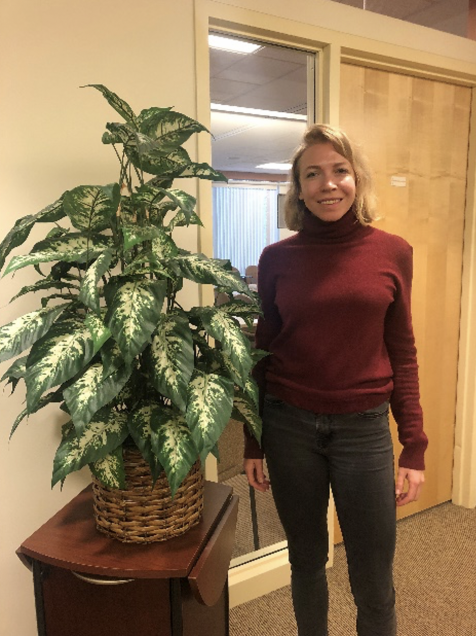Core and Cohort Updates
Admin Core
The Admin Core team has started preparing for a very modified and focused 10th Annual URBAN ARCH Meeting as it will need to be held virtually. On March 17th, 2021, this small virtual meeting will focus mostly on trainee activities. Please keep an eye out for additional information coming your way very soon. In addition, on September 29th, the Admin Core successfully facilitated a DSMB Meeting entirely over Zoom and are looking ahead to the next DSMB meeting on March 16th.
A few Admin Core staff have been working on-site at BMC in the sample repository. Since the physical relocation of the repository in August, a large USDTL shipment containing DBS cards for PEth testing has been shipped out, tested, and returned to Boston. New shipment requests are currently being processed and will be completed within the next couple of months. For more information on the URBAN ARCH sample repository, please visit our webpage. If you have questions regarding the URBAN ARCH repository, please contact Natalia Gnatienko.
BDM Core
BDM Core members collaborated throughout the fall on three new center grant proposals related to the URBAN ARCH Consortium. Two of the three applications, the International URBAN ARCH Center and the Boston ARCH CC applications, both included a BDM Core proposal. Data management and biostatistics activities continue to run smoothly as Core members work remotely. Several analytic plans and manuscripts are in progress across the consortium.
Uganda Cohort
ADEPTT
The ADEPTT study was briefly paused from March 26, 2020 through May 26, 2020 in response to the COVID-19 pandemic and the public health response. Study activities have been going smoothly since resumption and retention has been excellent. As of December 1, 2020, we have completed baseline procedures for all 302 participants enrolled, 295 month-3 visits, 292 month-6 visits, 283 month-12 visits, 201 month-18 visits, 151 month-24 visits, 99 month-30 visits, 55 month-36 visits, and 8 month-42 visits. Twenty-six participants have discontinued TB preventive therapy (INH) due to grade 3/4 level toxicities and three women have discontinued INH due to being pregnant. We shipped 950 dried blood spot (DBS) samples from Uganda to United States Drug Testing Laboratory (USDTL) in Illinois, USA for phosphatidyl ethanol (PEth) testing. We are awaiting results of the presence of this alcohol biomarker to complete analyses and the manuscript for the ADEPTT main aims.
Our COVID-19 related administrative supplement was funded in late September, 2020. With this funding, we will look at changes in alcohol use, ART levels, and viral suppression before, during, and after stay-home restrictions in PLWH in Uganda and Boston and the association of alcohol use and changes in alcohol use with these outcomes in the same cohorts. We are currently finalizing protocols and regulatory submissions to enable study start up in the next month.
DIPT
The main aims of this randomized controlled trial (the DIPT study) are to examine whether economic incentives provided to HIV/TB co-infected heavy drinkers can reduce alcohol use and increase adherence to isoniazid preventive therapy (IPT). The DIPT study is progressing well. As of December 1, 2020, we have enrolled 553 participants out of our target enrollment of 680. Retention has been excellent. Data analyses are ongoing as well as manuscript writing.
EXTEND
The main aims of the EXTEND RCT are to estimate the uptake and acceptability, preliminary efficacy, and cost of methods of delivery of an intervention to reduce unhealthy drinking and HIV viral failure among persons in HIV care in rural Uganda (n=270). As of December 1, 2020, we enrolled 262 participants. We are in the process of writing manuscripts from qualitative data collected during our formative work and are also completing analyses for a manuscript on the costing data. We finalized the shipment of 450 DBS samples from Mbarara, Uganda to USDTL, Illinois, USA for PEth testing.

Boston Cohort
As of December 1, 2020, the team has completed 251 baseline visits (176 with participants from the original Boston ARCH Bone Cohort and 75 with participants new to the cohort). A total of 233 6-month follow-up phone interviews, 194 12-month annual follow-up visits, 152 18-month interim follow-up phone interviews, 92 24-month annual follow-up visits, and 24 30-month follow-up phone interviews have been completed.
After a hiatus from in-person research and study enrollment due to the COVID-19 pandemic, the Boston ARCH: 4F Cohort has resumed these research operations. The annual assessment has been restructured to be comprised of two parts: (1) interview portions of the assessment that can be conducted through remote data collection over the phone and (2) physical portions of the assessment that must be conducted in-person (such as balance testing, grip strength, and walking speed). In the interest of participant safety and comfortability, participants have the option of completing the annual assessments in a hybrid format where part 1 interview portions continue to be collected over the phone and part 2 physical portions are completed in-person.
Following the conclusion of the collection and analysis of qualitative data used to inform the development of a tailored falls prevention intervention, we are drafting the protocol for a pilot study of the intervention. The study aims to enroll 40 participants who will be randomized to either the intervention group (receiving the fall prevention intervention) or a control group. After the study protocol is finalized and approved by the Boston University Medical Campus Institutional Review Board, participant recruitment and enrollment will begin.
In September we were awarded supplemental funding from NIAAA via a competitive revision to expand the scope of our existing Boston ARCH: 4F Cohort study. The funding will allow the study team to administer supplemental COVID-19 specific assessments to Boston ARCH: 4F Cohort participants at two time points (6 months apart). The goal of these supplemental assessments is to assess the impact of the COVID-19 pandemic and the effects of physical (social) distancing and other mitigation strategies on substance use (heavy alcohol use and/or other drug use including nonmedical prescription medication use) and HIV medication adherence among people living with HIV. The supplemental COVID-19 specific assessments will be implemented in the coming weeks.
Russia Cohort
The Russia team has completed follow-up for all St PETER study visits, as of December 15th, 2020!
St PETER HIV and SCRIPT, an URBAN ARCH-affiliated study, have both received COVID-19 competitive revision awards. We expect to begin recruiting for both studies within the next few months. Below is a description of the studies:
URBAN ARCH (4/5) Russia Cohort – Targeting HIV-comorbidities with Pharmacotherapy to Reduce Alcohol and Tobacco Use in HIV-infected Russians – COVID Study is an NIAAA-funded competitive revision (U01AA020780-10S1, PIs: Jeffrey Samet/Matthew Freiberg/Hilary Tindle) that will examine whether COVID-19 co-infection among PLWH who drink and smoke increases inflammation (e.g., IL-6), alters the gut microbiome by reducing beneficial butyrate-producing bacteria, which protect the gut from microbial translocation, and, by extension, alters the plasma metabolome as reflected in lower plasma butyrate levels. This project is funded for two years from 09/01/20 until 08/31/22.
Stigma, Risk Behaviors and Health Care among HIV-infected Russian People Who Inject Drugs (SCRIPT) – COVID Study is a NIDA-funded competitive revision (R00DA041245-05S1, PI: Karsten Lunze) that will assess the evolving consequences of the COVID-19 pandemic on health risks and risk behaviors of HIV-positive people who inject drugs through qualitative interviews with patients and providers, and explore the pandemic’s impact on stigma and human rights in St. Petersburg, Russia. This project is funded for one year from 09/01/20 until 08/31/21.
Marina Vetrova gave a virtual oral presentation at this year’s Evans Day, an annual research showcase for the Boston University Medical Campus Department of Medicine. Her presentation titled “A qualitative study of HIV-positive patients’ navigation of addiction care in Saint Petersburg, Russia” was based on her work with the URBAN ARCH-affiliated SCRIPT study, which explored experiences of HIV-positive people who inject drugs navigating addiction care at private and public clinics. The poster and abstract can be accessed here (registration required).

The team is actively pursuing data analyses, abstract submissions, and manuscript preparation.
Published Manuscripts:
Wagman JA, Wynn A, Matsuzaki M, Gnatienko N, Metsch LR, Del Rio C, Feaster DJ, Nance RM, Whitney BM, Delaney JAC, Kahana SY, Crane HM, Chandler RK, Elliot JC, Altice F, Lucas GM, Mehta SH, Hirsch-Moverman Y, El-Sadr WM, Vu Q, Nguyen Thanh B, Springer SA, Tsui JI, Samet JH. Hazardous alcohol use, antiretroviral therapy receipt, and viral suppression in people living with HIV who inject drugs in the United States, India, Russia, and Vietnam. AIDS. 2020;34(15):2285-2294
